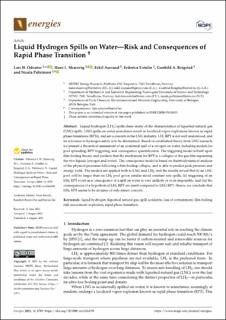| dc.description.abstract | Liquid hydrogen (LH2 ) spills share many of the characteristics of liquefied natural gas (LNG) spills. LNG spills on water sometimes result in localized vapor explosions known as rapid phase transitions (RPTs), and are a concern in the LNG industry. LH2 RPT is not well understood, and its relevance to hydrogen safety is to be determined. Based on established theory from LNG research, we present a theoretical assessment of an accidental spill of a cryogen on water, including models for pool spreading, RPT triggering, and consequence quantification. The triggering model is built upon film-boiling theory, and predicts that the mechanism for RPT is a collapse of the gas film separating the two liquids (cryogen and water). The consequence model is based on thermodynamical analysis of the physical processes following a film-boiling collapse, and is able to predict peak pressure and energy yield. The models are applied both to LNG and LH2, and the results reveal that (i) an LNG pool will be larger than an LH2 pool given similar sized constant rate spills, (ii) triggering of an LH2 RPT event as a consequence of a spill on water is very unlikely or even impossible, and (iii) the consequences of a hypothetical LH2 RPT are small compared to LNG RPT. Hence, we conclude that LH2 RPT seems to be an issue of only minor concern. © 2021 by the authors. Licensee MDPI, Basel, Switzerland. Author keywords Explosion; Film boiling; Liquefied natural gas; Liquid hydrogen; Loss of containment; Rapid phase transition; Risk assessment; Spill accidents | en_US |

